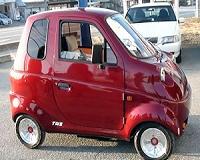 |
Seoul (AFP) March 9, 2010 South Korean researchers Tuesday launched an environmentally friendly public transport system using a "recharging road" -- with a vehicle sucking power magnetically from buried electric strips. The Online Electric Vehicle (OLEV), towing three buses, went into service at an amusement park in southern Seoul. If the prototype proves successful, there are plans to try it out on a bus route in the capital. The Korea Advanced Institute of Science and Technology (KAIST), which developed the system, says OLEV needs a battery only one-fifth the size of conventional electric vehicles and eliminates the need for major recharging. It also avoids the need for overhead wires used to power conventional trams or trolley buses. Guests including Seoul mayor Oh Se-Hoon and KAIST president Suh Nam-Pyo were given a 2.2-kilometre (1.4-mile) ride Tuesday around the zoo at Seoul Grand Park. Recharging strips have been installed in four segments totalling some 400 metres along the route. Pick-up equipment underneath OLEV collects power through non-contact magnetic charging from strips buried under the road surface. It then distributes the power either to drive the vehicle or for battery storage. If the system is used on Seoul bus routes, underground power lines would have to be installed on only 20 percent of the route at places like bus stops, parking places and intersections, KAIST said in a statement. The technology was first developed in a project involving the University of California (Berkeley) but KAIST said that produced no tangible results. The state-funded institute says it has applied for more than 120 patents in connection with OLEV, which it describes as safe, clean and economical. "Of all the world's electric vehicles, this is the most economical system," Suh told reporters, adding the operating cost is only about one-third of ordinary electric vehicles. "The potential for application (of this technology to public transport systems) is limitless. I dare say this is one of the most significant technical gains in the 21st century," Suh said. Suh said KAIST plans to use OLEVs to shuttle delegates at the G20 summit which Seoul will host in November. Project director Cho Song-Ho said technical breakthroughs included an improved way of transmitting power to the pick-up device on the vehicle chassis. Cho said a gap of at least 11 centimetres (4.4 inches) was needed to take account of bumpy roads, while OLEV can suck power across a gap of up to 25 cm. Given a normal gap, the vehicle can turn more than 70 percent of the charge into energy for the vehicle, he said.
Share This Article With Planet Earth
Related Links Car Technology at SpaceMart.com
 Small is beautiful: Japan's hand-made electric cars
Small is beautiful: Japan's hand-made electric carsToyama, Japan (AFP) March 4, 2010 While auto manufacturing giants spend millions to develop environmentally-friendly electric cars, one Japanese company has taken a more low-key approach, crafting hand-made "green" cars. Takeoka Jidosha Kogei may be the antithesis of the world's Hondas and Nissans. The family-run business makes its cars from scratch in a garage workshop in the snowy foothills in the northwest of the country. ... read more |
|
| The content herein, unless otherwise known to be public domain, are Copyright 1995-2010 - SpaceDaily. AFP and UPI Wire Stories are copyright Agence France-Presse and United Press International. ESA Portal Reports are copyright European Space Agency. All NASA sourced material is public domain. Additional copyrights may apply in whole or part to other bona fide parties. Advertising does not imply endorsement,agreement or approval of any opinions, statements or information provided by SpaceDaily on any Web page published or hosted by SpaceDaily. Privacy Statement |